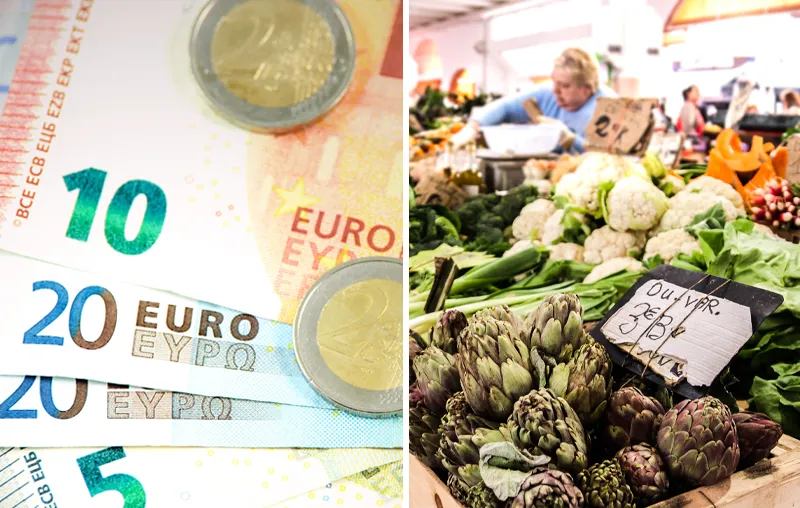Want to protect yourself from inflation? Then you've come to the right place! You've probably noticed that your money is running out much faster than it used to. You are not alone in this realization. Inflation is mainly to blame. It causes the prices of goods and services to rise sharply and the value of money to fall.
Whether at the supermarket checkout, at the petrol station or on the electricity bill - inflation can be felt in all areas of everyday life and scares many people. It also leads many of us to opt for cheap environmentally harmful products rather than inexpensive environmentally friendly ones. Fortunately, there are ways and means of coping with the times when everything is getting more expensive.
In this article, I would therefore like to give you the best tips to counteract inflation. Use them to prepare for higher prices, protect your money and make yourself more independent. Let's go!
Definition: What does inflation actually mean?

I've put something else here in advance Background knowledge on inflation have compiled. In order to counteract inflation, we need to understand exactly what it is and what causes it.
In a market economy, it is perfectly normal for the prices of individual products and services to change constantly. Inflation, however, is a Process of the loss of purchasing power of a currencywhich can typically be recognized by a general price increase for (all) goods and services in an economy. This means that you can buy less for the same amount of money (e.g. €1) than before, as it is worth less.
The Causes of inflation1 are of a different nature. I have listed some of them for you here:
- Devaluation of a country's exchange rate
- Increased money supply (monetary inflation)
- Cost pressure (cost-side inflation)
- Demand pull (demand-driven inflation)
- Wars or natural disasters (with an impact on trade)
- Political measures or uncertainties
- Rising wages
The average impact of inflation on the price level of private consumer goods can ultimately be measured using the so-called Inflation rate measure. It represents the percentage change in the consumer price index compared to the same period in the previous year. In Germany, it was 3.8% in October 2023 - a year earlier it was 8.8%.2
10 tips: What can each individual do personally to combat inflation and high prices?

So we know what inflation is and how it occurs. But what can we do about inflation? The bad news first: from the consumer's point of view, it is basically impossible to stop inflation. But don't worry: you're not completely powerless either. Because the good news is that you can learn to deal with the general rise in prices and adjust to inflation.
Simply use the following tips. Also in order to Practical solutions and strategies for everyday life that is as inflation-proof as possible.
1. reduce running costs
When everything becomes more expensive, the first logical step is of course to reduce your own monthly Critically review expenditureto identify unnecessary costs and reduce them in a targeted manner.
The first points of contact for this are the Household, mobility and grocery shopping. I have put together a few tips for you here:
- Save energy costs: Venting the radiators, for example, can reduce heating costs. Also as far as possible cold shower and switching to a green electricity tariff are easier on the wallet. (see Save electricity)
- Reduce fuel costs: Fill up on Tuesdays or Wednesdays between 6 p.m. and 10 p.m., as experience has shown that the prices at the gas station are the lowest. In general, however, you should also drive with foresight and reduce the weight in the car as much as possible. (see sustainable driving)
- Avoid food waste: Plan your meals for the week and only shop for them - also to prevent impulse purchases. Also, don't take the best-before date too seriously, but rather rely on your senses. (see Reduce food waste)
- Check insurance policies: Health, liability, car and disability insurance are generally essential - but not all insurances are really necessary. Cell phone insurance and accident insurance, on the other hand, rarely make sense and are quite expensive.
- End monthly subscriptions: Subscriptions to daily newspapers, magazines or streaming services are expensive. Use the times of high price increases to check whether there are cheaper alternatives - or whether you still need them at all.
Notice: These are just a few examples! Experience has shown that there are hundreds of ways to minimize your everyday costs. For example, you could also stop smoking, carpooling to work with colleagues or reducing high-interest debt as a preparatory measure.
2. always consider advance payments and annual payments
In the event of inflation, it is important to avoid financial bottlenecks. This can become a real balancing act when gas prices rise, for example. In order to reduce the pressure on your wallet, you should gas price to be paid, your consumption and the exact costs at all times - and switch to a cheaper provider if necessary. In order to reduce the costs somewhat in the event of inflation, it is also advisable to check the Increase advance payments.
"Oh, that will also be deducted..." - Do you also know those phrases that come to mind when you look at your bank statement or online banking transactions? To prevent unpleasant financial surprises, you should therefore also keep an eye on (quarterly/semi-annual) payments, such as insurance premiums, tax arrears or other higher costs.
3. increase income and diversify sources of income
This tip can be both a preventive and an acute measure against the devaluation of money due to inflation: Try to increase your monthly income to better cushion higher costs.
You can do this, for example, by New qualifications acquire or justify a Salary increase or a Meal allowance ask. The latter subsidizes the cost of employees' meals (via the employer) and is another way for you to have more money left over at the end of the month.
To minimize the risk of income fluctuations or to increase your income, it is also advisable to have several sources of income. One Second job, the Founding a (small) business or the Investment in dividend shares could, for example, increase your financial security and flexibility in uncertain times.
Tip: Just like you Start a business without equity capital I will explain in detail in a separate blog post.
4. invest capital wisely
Speaking of investing! In times of inflation, it is particularly important to invest your capital cleverly in order to counteract the loss of monetary value. For example, I personally invest in Broadly diversified, sustainable ETFs (Exchange Traded Funds) with the aim that my return is always significantly higher than the inflation rate.
In my monthly savings plan, I also have a Dynamic adjustment of the savings rate in order to keep pace with the successive price increases caused by inflation.
5. make more independent

To counteract inflation, you can take a few steps to less reliant on (expensive) goods and services and live as self-sufficiently as possible.
I have also listed a few ideas that you can implement:
- Fruit and vegetables Grow your own in the garden
- Collecting rainwater in the garden and use (e.g. with a cistern or rain barrel)
- Photovoltaic system install and at home Solar energy use
- Produce your own cleaning agents (e.g. Oven cleaner made from baking soda or Washing-up liquid made from ivy leaves)
- Build furniture yourself (see also DIY Furniture Blog)
- Cook it yourselfinstead of eating ready meals or in restaurants
Ultimately, the aforementioned measures not only reduce your dependence on market prices, but also also promote the Sustainability of your lifestyle and - in my personal experience - also the entire Quality of life.
6. renounce consumption and practice minimalism
What I mean by foregoing consumption is quite simply that you give up your well-earned money, which loses value during inflation. Only spend money on the things you really need should. Shopping trips, trips to the movies, vacations or a new car are not necessarily part of the equation during a period of high prices. You should therefore avoid such Emotion-related purchases and expenses.
Simply adapt the minimalist lifestyle. It focuses precisely on avoiding a new purchase as far as possible and only using the Owning things that you really need in life.
Here are a few Examples of minimalist thinking and action:
- Repair an old toaster
- Replace Replacing disposable products with reusable alternatives
- Loan a drill from the neighbors
- Buy used (e.g. a second hand sweater)
- …
All these things reduce your expenses and can protect you from acute cash shortages caused by inflation. At the same time, they are also proof that you can Save money through sustainable action can.
7. train buying behavior and compare prices
Of course, you can't and don't have to avoid all new purchases! But if you want to save money and counteract inflation, you should at least Avoid emotional impulse purchases.
For example, by buy strictly according to plan and sleep on it for a night before you buy a certain "object of desire". If you go shopping sober and with a plan, you are guaranteed to find it much easier to buy only the most important things and save money.
I can also only advise you to compare prices. Both for gasoline at the gas station and cucumbers at the supermarket, as well as for Price comparisons on the Internet. You should also check again before making any necessary purchases to see if you have any other Discount code can catch.
8. save money and build up reserves
Each of us should have a Nest egg for unexpected costs to the side - this also applies to inflation, of course. Because if the worst comes to the worst, you need a buffer to be able to cope with increased market prices or forgotten direct debits.
So set aside an amount every month that you can spare in order to be prepared. Again, an ETF savings plan is the best way to do this, as it gives you a certain return directly in the form of interest and any price gains. With such reserves, you create a Financial safety netthat helps you protect yourself against inflation.
9. invest in tangible assets

We have already talked about investments in the course of this article - but I have an important addition for you. Investing in tangible assets that will always have a value and whose value increases steadily as a rule.
These are for example Real estate, precious metals (e.g. gold and silver), Shares (i.e. company shares) Works of art (e.g. paintings by famous artists) or also Spirits-rarities and rare Cars and Watches. With a little research, you can find exactly those tangible assets that will maintain or increase your cash value and counteract inflation.
10. implement tips and keep calm
In times of economic uncertainty, you should Always keep a cool headinstead of being afraid that prices could possibly rise even further. Experience has shown that panic reactions lead to hasty decisions that rarely improve a situation.
With every tip from this article and every other measure you implement, you counteract inflation. By investing in ETFs alone, you ensure that you will still be able to afford the same things or even more for your money in 5 years' time than you can today.
Tip: I have compiled a suitable list for you in another article, how you can easily become much more relaxed. If you're interested, take a look at the tips.
Counteract inflation and counter high prices with confidence
The most important realization is that none of us has to stand idly by and watchhow your own money is losing value. Instead, you have learned a few practical strategies here and now to counteract inflation - from reducing unnecessary expenses, increasing your income and investing your money to investing in tangible assets. Simply implement them within the scope of your individual possibilities.
"Invest in inflation. It is the only thing going up."
Will Rogers, US-American comedian (more at Money quotes)
I hope that this article has helped you to develop a deeper understanding of inflation and its effects. And that, with the help of the tips, I have been able to allay any worries you may have.
Do you have any questions, suggestions or your own experiences and tips on dealing with inflation that you would like to share? Then please write me a comment.
Stay confident,

PS: If you like, you can now learn in the next blog article how to optimize your Invest money sustainably. Good luck!
- Kevin L. Matthews II: The six most important causes of inflation - explained so that everyone understands them (as at: 17.07.2022), available at https://www.businessinsider.de/wirtschaft/finanzen/die-6-wichtigsten-ursachen-einer-inflation-ganz-einfach-erklaert. [08.12.2023]. ↩︎
- Federal Statistical Office; Statista GmbH: Inflation rate in Germany from November 2021 to November 2023, available at https://de.statista.com/statistik/daten/studie/1045/umfrage/inflationsrate-in-deutschland-veraenderung-des-verbraucherpreisindexes-zum-vorjahresmonat. [08.12.2023]. ↩︎









